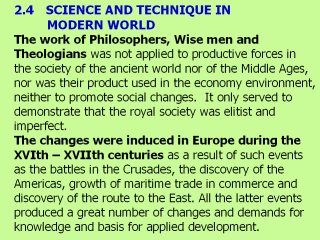 |
Science could not be elitist anymore; now, it
would have to be available to everyone and able to solve the problems of
producers, sailors, merchants, politicians, social reformers, and everyone
else. Two major decisive events occurred in the Europeís Renaissance
during the XVIIth and XVIIIth centuries: urbanization and population growth.
These two phenomena brought about a huge demand on the ways of living so
that it transformed the manufacturing industry, and as a result of
colonization the economy prospered. Urbanization was a result of
great number of country people attracted to the cities, and who were running
away from feudal settlements They became incorporated into new ways of life,
ways in which the possibility to produce their own food, clothing and
utensils had disappeared, and it was necessary to obtain them through
commerce. This caused the economy to prosper which forcibly resulted in
population growth. Those two social phenomena by the XIX th century
had generated a huge demand on the ways of life, and as result of it, in the
manufacturing and mechanized industries, and in the technical division of
labor, all of which had to be transformed. Science became a productive
force by itself, giving rise to the role of the professional, a social
individual specialized in the comprehension of the scientific world, and it
applications to productive processes such as technologies. England, and
Great Britain as a whole, is known as the factory of the world because
its hills and countryside contain vast amounts of coal and iron deposits. It
provided low-cost fuel for the textile industry, which derived in as a
necessity for machinery, steel, steam engines, dies, tints and soap. All of
the above required low costs and fast transportation, which was provided by
steamboats and railroad. Thanks to coal deposits in Wales, Scotland and
North and Central England, and iron deposits in the Penning Chain, the
United Kingdom became the first industrialized nation in the world. The
ancient mines of tin at Cornwall had been a basic resource for Englandís
prosper since medieval times. |
